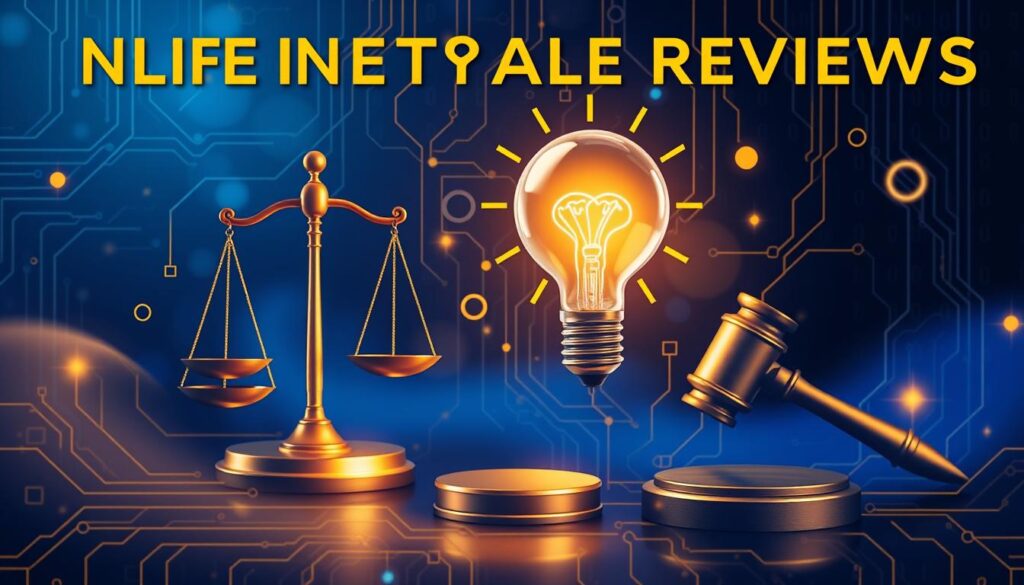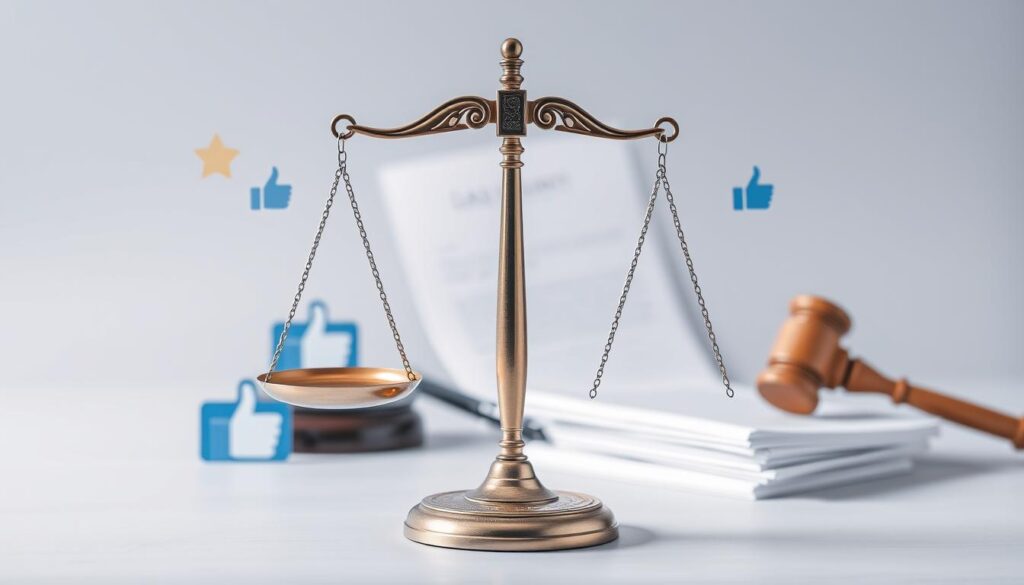Have you ever thought about how a simple reply to an online review could put your law firm in trouble? In today’s digital world, managing your online image is key. But, it comes with legal risks. We’ll look at how to protect your business and follow the law with client feedback.
Online reviews are powerful in guiding what people buy. A huge 89% of shoppers check out ratings and reviews before they buy, and 60% think negative reviews are as important as the positive ones1. For law firms, this shows how important it is to manage your online image and follow the law.
The Consumer Review Fairness Act (CRFA) has changed the rules for businesses. It protects people’s right to share honest thoughts about products or services on any platform, like social media2. Law firms need to be careful when answering reviews, making sure they don’t cross the line and infringe on clients’ rights.
Answering reviews is more than just fixing problems; it’s a chance to show you care about your clients. Over 70% of brands use negative reviews to improve customer service, and responding to them can increase the chance of someone buying by 186%1. This shows how you can turn a bad experience into a good one, all while following the law.
Key Takeaways
- Online reviews greatly affect what people decide to buy
- The CRFA protects consumers’ right to share honest opinions
- Answering reviews can increase the chance of someone buying
- There are legal risks when dealing with client feedback
- It’s important to balance managing your reputation with following the law
Understanding the Importance of Online Reviews
Online reviews are key to a business’s online image and help shape what customers think. Today, they’re a big deal for people looking to check out products and services. A huge 98% of folks read these reviews before making a buy34.
Star ratings and comments on review sites really matter for local SEO and how well a business does. Items with five reviews are way more likely to sell than those with none4. This fact shows how crucial it is to get and manage customer reviews well.
Companies need to keep an eye on their reviews across different sites to stay looked up to. Google is a big deal, holding 73% of all reviews and used by 87% of people to check out local shops3. Yelp, Facebook, and Tripadvisor are also big names.
It’s just as vital to answer reviews as it is to get them. Up to 97% of people look at how companies reply to feedback3. Quick and professional answers show you care and can lessen the sting of bad reviews. In fact, 64% of shoppers prefer to shop from a company that talks back over one with a flawless rating3.
| Impact of Review Responses | Percentage |
|---|---|
| Consumers more likely to use a business that responds to all reviews | 88% |
| Consumers more likely to use a business that responds only to negative reviews | 60% |
| Consumers more likely to use a business that responds only to positive reviews | 50% |
By getting the value of online reviews and handling them well, businesses can boost their online image, better their local SEO, and grow through good customer feedback.
Defamation and libel risks in review responses
Online reviews can greatly affect a business’s success. A huge 90% of consumers look at reviews before buying something5. This power comes with risks of defamation and libel for both reviewers and businesses.
False statements in reviews can hurt a business’s reputation and lead to legal trouble. To win a defamation case in most U.S. states, a business must prove a false statement was shared, causing harm to its reputation5. It’s important to know the difference between opinions and facts when checking for defamation.
The Consumer Review Fairness Act protects honest opinions from consumers. But, it doesn’t cover false or defamatory statements. Businesses need to be careful when answering negative reviews to avoid legal problems.
Before taking legal action, businesses should think about the risks. About two-thirds of states have laws to protect free speech. In these cases, the person being sued often wins 77% of the time6. Legal battles over defamation can be costly and time-consuming, causing more harm than the original review.
“The court of public opinion can be more damaging than a court of law. Consider the Streisand effect before taking legal action against a negative reviewer.”
In today’s digital world, having both positive and negative reviews can actually help a brand. More than two-thirds of consumers trust brands that show both kinds of reviews5. This shows the value of handling all reviews well, focusing on customer service over legal threats.
Privacy and Confidentiality Concerns
Privacy and confidentiality are key in healthcare and legal fields when dealing with reviews. Healthcare providers must follow HIPAA rules to protect patient info. HIPAA has four levels of violations with fines from $100 to $50,000 per incident. The top fine can hit up to $1.5 million a year7.

Lawyers must keep client secrets as part of their job. Companies should not share personal info about customers in public. This rule is true even if the customer shared their info first. Keeping secrets builds trust, lowers worries, keeps dignity, and supports freedom8.
The Security Rule helps protect health info sent online by health plans and providers. It keeps e-PHI safe, secure, and available. Covered groups must guard against threats to e-PHI security and integrity9.
To keep info private and safe, companies should:
- Have confidentiality agreements with staff
- Train employees on privacy laws
- Use secure systems for customer data
- Have clear rules for handling sensitive info online
Putting privacy and confidentiality first helps businesses keep customer trust. Remember, for every unhappy customer, 26 others might not speak up. This shows why it’s key to handle concerns well and respect privacy7.
Intellectual Property Considerations
In today’s digital world, intellectual property rights are very important for review responses. We need to be careful to avoid copyright and trademark issues when we talk about customer feedback. It’s important to think about who owns the content, especially when using what customers create in our marketing.
It’s key to understand the fair use doctrine for businesses. This rule lets us use copyrighted material without permission under certain conditions. But, it can be hard to know when you’re allowed to use it. Digital rights management systems help protect our intellectual property, but they’re not perfect10.

When we answer reviews, we should be careful not to use copyrighted images or logos. This is also true for equity purchases, where the buyer gets all the IP of the target company11. In asset purchases, only the IP that’s clearly given is owned, so we must know what we’re getting.
“Intellectual property is a key asset in today’s business landscape. Protecting it while engaging with customers requires a delicate balance.”
Trade secrets are very valuable for many companies. We must protect them well with non-disclosure agreements and security11. It’s also important to look into IP disputes and possible infringement claims to see how they might affect our business.
| IP Consideration | Key Points |
|---|---|
| Copyright | Avoid using copyrighted material without permission |
| Trademarks | Be cautious when mentioning brand names or logos |
| Fair Use | Understand limitations and applications |
| Digital Rights | Implement protection systems for owned content |
Legal Considerations for Review Responses
When we answer reviews, we step into a complex legal world. We must follow platform rules and terms of service closely. The Federal Trade Commission (FTC) has strict rules about how we handle reviews.
The FTC says we must be clear about any ties we have with reviewers. We should always be honest about who we are when we reply to reviews. It’s also important to avoid making false claims. For professionals like lawyers, there are even more rules from state bar groups.

Reviews have a big effect on businesses. Most consumers trust online reviews as much as advice from friends, and many avoid businesses with bad reviews12. This shows how crucial it is to handle reviews right and follow the law.
Some review sites are very strict to make sure reviews are real. For example, G2 makes reviewers use a LinkedIn™ account or a verified business email. They check reviews carefully before they go live13.
| Legal Aspect | Key Consideration |
|---|---|
| FTC Regulations | Disclosure of material connections |
| Platform Guidelines | Compliance with specific rules |
| Ethical Considerations | Professional conduct standards |
| Privacy Laws | Protection of reviewer information |
It’s important to know that laws protect both businesses and reviewers. For example, California’s “Yelp Law” can fine businesses up to $10,000 for trying to get back at negative reviewers12. By understanding these laws, we can make responses that protect our business and respect reviewers’ rights.
Strategies for Addressing Negative Reviews Legally
Handling negative reviews needs a careful, professional touch. It’s key to respond quickly, as many customers expect answers within a day or two14. Our approach is all about solving problems and keeping a calm tone.
We focus on giving constructive feedback. It’s important to stick to facts and speak clearly without blaming anyone15. We mix in some praise with the criticism to avoid personal attacks. This way, we solve issues and stay out of legal trouble.

Talking things out offline works best for tricky problems. We suggest moving the conversation to a private space for more detailed solutions. This method can boost customer loyalty by up to 43%14.
If a review is false or defamatory, we look into removing it. But we’re careful, as truth is a strong defense against legal action15. If needed, we get legal advice to handle these situations right.
By focusing on what customers say and using these strategies, companies can see revenue increases of 4% to 8%14. Remember, dealing with reviews is not just about defending your reputation. It’s about making customers happier and building trust.
Leveraging Positive Reviews While Staying Compliant
Positive reviews are key to building trust and credibility with potential clients. They help us look better and make it easier to get new clients and keep the old ones16. In fact, 93% of consumers say online reviews affect their buying choices17.
To make the most of positive reviews, we need to follow some rules:
- Share testimonials on our website and marketing with customer okay
- Make sure all shared reviews are real and unchanged
- Answer client reviews quickly and well
- Ask happy customers to leave reviews often
Using schema markup for rich snippets in search results can increase click-through rates17. We should check how reviews affect our marketing by tracking conversion rates17.
Some industries have special rules for using client testimonials. For example, legal and financial services have stricter rules. Google, the biggest review site, lets businesses ask for reviews but says no to review gating and buying reviews18.
“Customer reviews give us valuable insights into what clients like and help us improve our services.”
By using positive reviews the right way, we can increase our social proof, make customers happier, and keep our marketing real.
Conclusion
We’ve looked into how to handle online reviews while following the law and protecting our business. Managing our online reputation is all about balancing what customers think and legal rules. By using best practices, we can deal with both good and bad reviews well.
It’s important to follow the law when answering reviews. We need to watch out for issues like defamation and privacy. The IRAC method (Issue, Rule, Application, Conclusion) helps us break down legal problems step by step19. This method makes sure we tackle a legal issue from start to finish.
Having clear rules for checking and answering reviews is key to protecting our business. Our staff should know about legal matters and get advice from lawyers when needed. By keeping up with laws and rules of online platforms, we can do well in the digital world. A proactive way of handling reviews not only keeps our reputation safe but also keeps us out of legal trouble later on.
FAQ
Why are online reviews important for businesses?
What legal risks are associated with responding to negative reviews?
What privacy concerns should businesses consider when responding to reviews?
Can businesses face legal issues related to intellectual property when responding to reviews?
What legal regulations and guidelines should businesses follow when responding to reviews?
How should businesses handle negative reviews legally?
Can businesses use positive reviews for marketing purposes?
What best practices should businesses follow for online review management?
Source Links
- How to respond to negative reviews: Examples and best practices – https://www.bazaarvoice.com/blog/how-to-respond-to-negative-reviews-examples-and-best-practices/
- Consumer Review Fairness Act: What Businesses Need to Know – https://www.ftc.gov/business-guidance/resources/consumer-review-fairness-act-what-businesses-need-know
- Why You Should Respond to Online Reviews – https://www.businessnewsdaily.com/9187-respond-to-online-reviews.html
- The Importance of Responding to Reviews Individually – https://www.mara-solutions.com/post/importance-of-responding-to-reviews-individually
- When Are Online Reviews Considered Defamation? – https://www.minclaw.com/when-online-reviews-defamation/
- Managing Negative Reviews: Legal Risks and Solutions – https://www.klemchuk.com/ideate/managing-negative-customer-reviews
- HIPAA-Compliant Patient Review Management | Healthgrades – https://b2b.healthgrades.com/insights/blog/how-to-stay-hipaa-compliant-when-responding-to-patient-reviews/
- Current Issues in Research Ethics : Privacy and Confidentiality – https://ccnmtl.columbia.edu/projects/cire/pac/foundation/
- Summary of the HIPAA Security Rule – https://www.hhs.gov/hipaa/for-professionals/security/laws-regulations/index.html
- Considerations Surrounding Intellectual Property – https://www.reviewofophthalmology.com/article/considerations-surrounding-intellectual-property
- Top Intellectual Property Issues to Think About in M&A Deals – https://www.gibsondunn.com/top-intellectual-property-issues-to-think-about-in-ma-deals/
- Should Businesses Sue Over Online Reviews? Read This Before You Act – https://blog.reputationx.com/bad-review-lawsuits
- Community Guidelines | G2 – https://legal.g2.com/community-guidelines
- Here’s Exactly How You Should Be Handling Sensitive Reviews Of Your Business – https://www.shoutaboutus.com/blog/how-to-handle-sensitive-reviews-of-your-business
- How to Write a Negative Review Without Getting Sued: A Guide | The Neuron – https://www.theneuron.ai/write/reviews/negative-review
- The role of customer reviews in lead generation: how to leverage positive reviews and testimonials – https://abmatic.ai/blog/role-of-customer-reviews-in-lead-generation-how-to-leverage-positive-reviews-and-testimonials
- From Feedback to Profit: Leveraging Customer Reviews for Digital Marketing Success – https://www.respired.io/post/from-feedback-to-profit-leveraging-customer-reviews-for-digital-marketing-success
- What Businesses Need to Know About Google’s Review Policy – https://www.reviewtrackers.com/blog/google-review-policy/
- Working With IRAC – https://www.tourolaw.edu/adp/studyskills/irac.aspx

